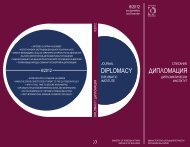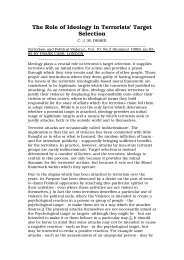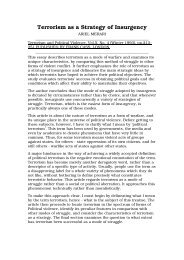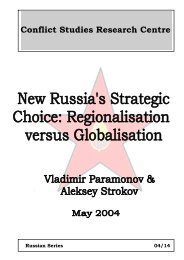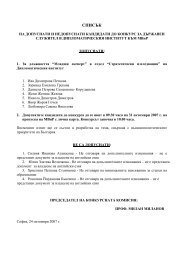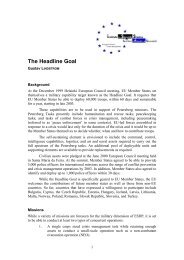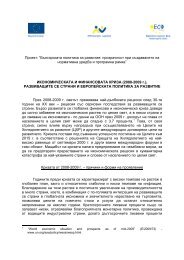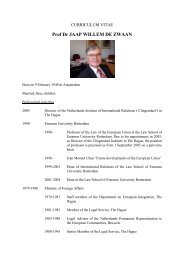The Myth of Ethnic Conflict: Chap 13 - Diplomatic Institute
The Myth of Ethnic Conflict: Chap 13 - Diplomatic Institute
The Myth of Ethnic Conflict: Chap 13 - Diplomatic Institute
Create successful ePaper yourself
Turn your PDF publications into a flip-book with our unique Google optimized e-Paper software.
510 Maria Todorova<br />
99. <strong>The</strong> quote is from one <strong>of</strong> the ultranationalist newspapers, Zora, 28 January<br />
1992. Cited in Konstantinov, “‘Nation-State’ and ‘Minority’ Types <strong>of</strong> Discourse,<br />
p. 77.<br />
100. Modeva.<br />
101. Konstantinov, “‘Nation-State’ and ‘Minority’ Types <strong>of</strong> Discourse,” p. 81.<br />
102. Excerpt from Henry Kissinger’s book, Diplomacy (New York: Simon and<br />
Schuster, 1994); published in Time, 14 March 1994, p. 76.<br />
103. For an account <strong>of</strong> the work <strong>of</strong> European institutions in the postwar period<br />
on the problem <strong>of</strong> ethnic minorities, see Rudolf Kern, “Europäische Institutionen<br />
und Minderheiten,” in Schwamm, ed., pp. 61–77.<br />
104. In this respect, see the ill-begotten initiative <strong>of</strong> French Prime Minister<br />
Edouard Baladur for signing a pact on European stability. This project,<br />
initiated in June 1993, although pro forma pan-European with the participation<br />
<strong>of</strong> the United States and Canada, was actually supposed to deal<br />
only with East Central and Eastern Europe, “the countries whose relations<br />
are not yet stabilized by their association with one <strong>of</strong> the great European<br />
political formations.” While verbally committed to the inviolability <strong>of</strong><br />
frontiers, the plan in fact envisaged the possibility <strong>of</strong> border changes. It<br />
also clearly showed a switch to the collective interpretation <strong>of</strong> minority<br />
rights. Preliminary discussions with all East European representatives who<br />
objected vehemently to the double standard virtually have invalidated the<br />
initiative. It is significant, however, that while France advocates collective<br />
rights <strong>of</strong> minorities as applied to Central and Eastern Europe, it has opposed<br />
this approach for the whole continent (see France’s stand at the<br />
Copenhagen conference <strong>of</strong> 1990, described in Kern, p. 68).<br />
105. Questions arise about the future <strong>of</strong> the Serbs in Bosnia. Are they going to<br />
be allowed to step into a confederation (even if not seen as a possible step<br />
for unification) with Serbia proper, as the latest information from the<br />
White House seems to indicate? What will the attitude toward the Kosovo<br />
Albanians be were they to demand a confederative status with Tirana at a<br />
later date? And the Albanians in Macedonia? And if the same happens to<br />
the Hungarians in Slovakia or in Romania? And all the Russians living in<br />
the former republics <strong>of</strong> the USSR?<br />
106. 168 chasa, 26 September 1993.<br />
107. Standart, 18 October 1993.<br />
108. In this respect, see the articles in the section on “<strong>Ethnic</strong> Relations and the<br />
Economy” in Aspekti na etnokulturnata situatsiya v Bîlgariya, vol. 1, pp.<br />
197–279.<br />
109. John Rex, “<strong>Ethnic</strong> Mobilization in a Multicultural Society,” Innovation in<br />
Social Sciences Research 5, 3 (1992): 72.<br />
110. Georgieva, p. 74.<br />
111. On identity diffusion and foreclosure, see Rex, p. 66.



